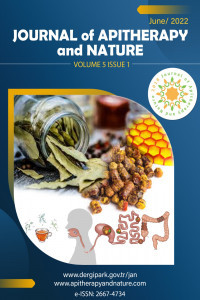Use of Propolis in Clinical Medicine. A review
Use of Propolis in Clinical Medicine. A review
Propolis Clinical medicine,
___
- .
- Yayın Aralığı: Yılda 2 Sayı
- Başlangıç: 2018
- Yayıncı: Oktay YILDIZ
Efrain ALDAY, Lucía URIBE, Dora VALENCIA, Adriana GARIBAY-ESCOBAR, Anna Lisa PICCINELLI, Luca RASTRELLI, Humberto ASTIAZARÁN-GARCÍA, Ramón Enrique ROBLES-ZEPEDA, Javier HERNANDEZ, Carlos VELAZQUEZ
Ana Sofia P. FREITAS, Ana João P. GOMES, Ana CUNHA, Rui P. S. OLIVEIRA, Cristina ALMEIDA-AGUIAR
Chemical Profile and Botanical Origin of Stingless Bee Propolis from Thailand and Indonesia
Antimicrobial Effect of Commercial Propolis Extract (BEEO©)
Aslı Elif TANUGUR, Sevgi KOLAYLI, Merve KESKIN, Sengul ALPAY KARAOGLU
The Effects of Propolis on Growth Performance of Broiler Chickens
İvana KLARIC, Matija DOMACINOVIC, Berislav PRAKATUR, İvan MISKULIN, Bozica LACHNER, Dalida GALOVIC, Danijela SAMAC
Antituberculosis Activity of Propolis
Jarosław WIDELSKI, Joanna GOLUS, Piotr OKIŃCZYC, Rafał SAWICKI, Grażyna GINALSKA, Tomasz MROCZEK, Zuriyadda SAKIPOVA, İoanna CHINOU, Krystyna SKALICKA-WOŹNIAK
María Inmaculada GONZÁLEZ-MARTÍN, Eddy Valentín BETANCES-SALCEDO, Isabel REVILLA, Ana María VIVAR-QUINTANA
Bíliková KATARÍNA, Yamaguchi YOSHIHISA
The Efficacy of Propolis Fluoride in Inhibiting Dental Caries Activity on Primary Teeth
Risqa Rina DARWITA, Iwany AMALLIAH, Sri Angky SOEKANTO, Muhamad SAHLAN
Some Apitherapeutic Properties of Chestnut Propolis
Sevgi KOLAYLI, Saliha EKSI, Zihni YAZICI, Oktay YILDIZ, Hüseyin SAHIN, Zehra CAN, Sengül KARAOGLU
